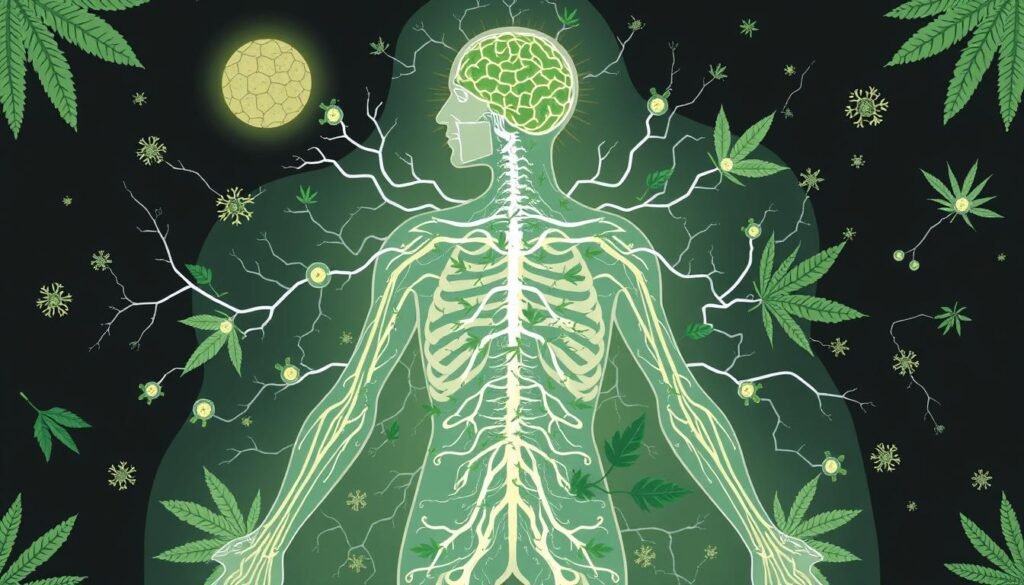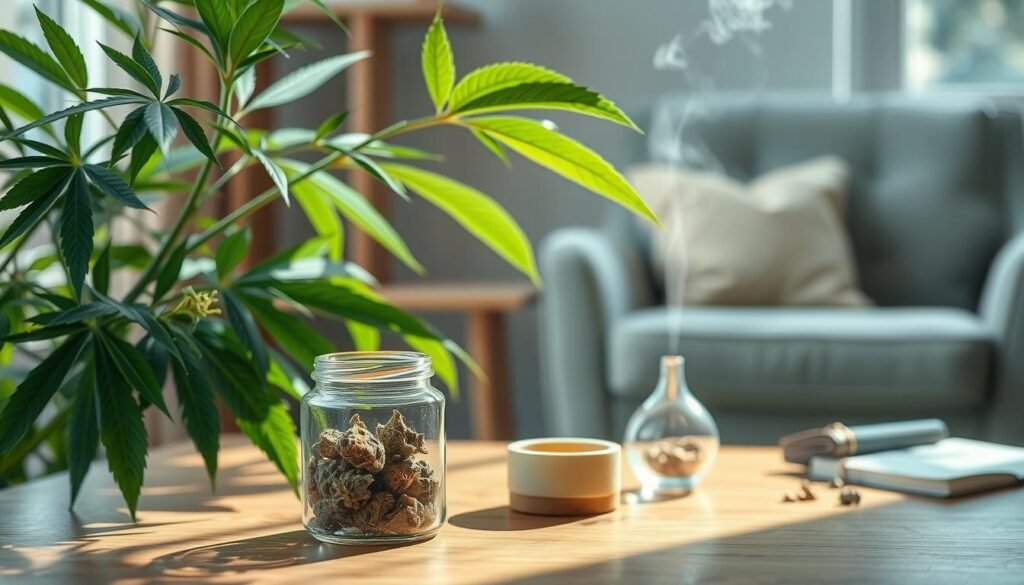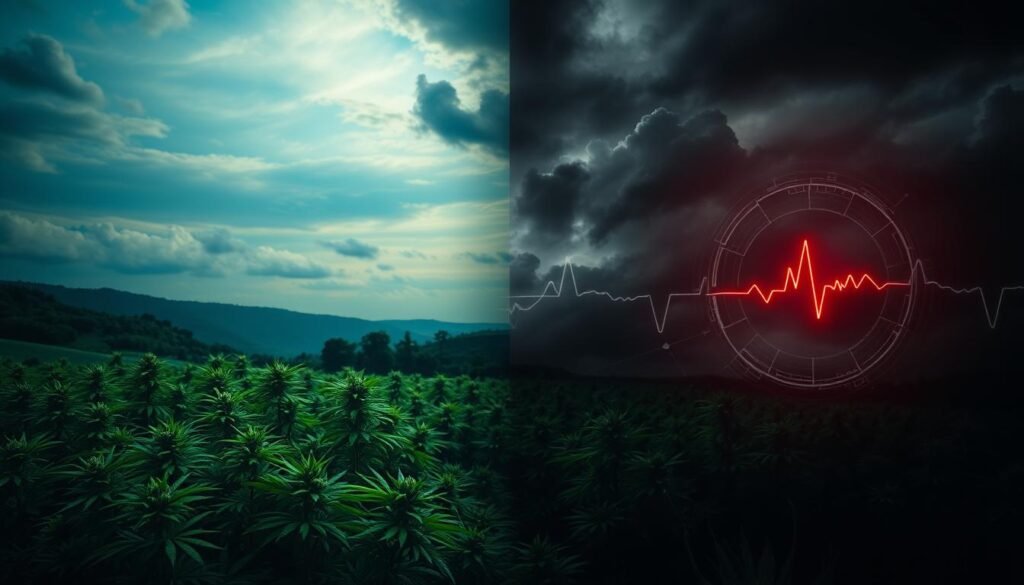Did you know that today’s cannabis strains have a lot more THC? They can have about 20% to 30%, which is more than double compared to a decade ago. This big increase in THC levels is changing how people deal with anxiety. Nowadays, with about 20% of U.S. adults facing anxiety issues, many are looking towards cannabis sativa. They hope its cannabinoids can help lessen their stress and anxiety.
THC, which is the main part of cannabis that affects the mind, is getting noticed for its possible anxiety-reducing powers. As folks look beyond traditional methods for soothing their anxiety, THC’s value as a natural option is getting more attention. This piece explores THC, dives into cannabinoid science, and looks at their promise for those fighting anxiety.
Key Takeaways
- Upwards of 20% to 30% THC levels are now common in modern cannabis strains.
- 1 in 5 adults in the U.S. suffer from anxiety disorders, highlighting the prevalence of this issue.
- The exploration of THC for anxiety is gaining traction as more individuals seek natural relief options.
- Combining THC with other cannabinoids may enhance its therapeutic effects.
- Research is ongoing to better understand THC’s impact on anxiety and stress management.
- New cannabis strains show promise for providing effective anxiety treatment.
Understanding Anxiety Disorders
Anxiety disorders are a type of mental health issue that greatly affects life. They show up through various anxiety symptoms. It’s crucial for everyone and health experts to notice these signs early. Catching symptoms early can make treatment for anxiety more successful, helping people take back control of their lives.
Common Symptoms of Anxiety
Those with anxiety disorders might show many symptoms that disrupt daily life. These often include:
- Nervousness
- Agitation
- Tension
- Racing heart
- Chest pain
These symptoms point out how critical it is to get the right help and support. They can stop a person from living a normal life.
Prevalence of Anxiety Disorders in the United States
About 31% of Americans will face anxiety disorders at some point. Sadly, only 46% of those with a diagnosis get the right treatment. This highlights why we need to spread the word and make good resources available to everyone.
The Role of Cannabinoids in Anxiety Management
Cannabinoids are natural compounds from the cannabis plant. They are known for their potential in managing anxiety. These include THC and CBD, which work with our body’s endocannabinoid system. This system is key in controlling mood and stress.
Learning how cannabinoids work can help create better anxiety treatments.
What Are Cannabinoids?
Cannabinoids are chemical compounds that target receptors in our brain and body. THC is psychoactive, affecting cannabinoid CB1 and CB2 receptors. On the other hand, CBD is not psychoactive. It balances THC’s effects, offering a combined benefit for anxiety.
Studies show that cannabis can help or harm anxiety. This proves its complex impact on us.
How Cannabinoids Affect the Brain
Cannabinoids mainly affect how we respond to anxiety. THC works with the limbic system, which includes the amygdala. This area is often overactive in those with anxiety disorders.
Depending on the amount and the person, THC can relax or increase anxiety. The endocannabinoid system also controls neurotransmitters like GABA and glutamate. These are crucial in anxiety management.
| Cannabinoid | Type | Effects on Anxiety |
|---|---|---|
| THC | Psychoactive | Can be anxiolytic or anxiogenic based on dose |
| CBD | Non-psychoactive | Exhibits anxiolytic properties, modulating THC |
| CBG | Non-psychoactive | Potential antibiotic and anti-inflammatory properties |
| CBN | Non-psychoactive | Potential sedative effects |
Research on cannabinoids is expanding. Those looking into cannabis for anxiety should weigh the properties of different cannabinoids. It’s also important to consider how an individual reacts to these compounds. For more on natural anxiety relief supplements, click here.
THC for Anxiety: Exploring the Evidence
Researching THC for anxiety reveals mixed results. Scientists are trying to figure out how THC affects our brain’s ability to manage anxiety. Some studies are hopeful, but there’s no clear answer yet.
Research Findings on THC and Anxiety Relief
Many studies show THC might help with anxiety, but it’s complicated. According to research, the effects differ among mental health conditions. Out of 83 studies examined, each one had its drawbacks. Some say cannabis could reduce anxiety and depression for a short while. Yet, doctors are careful with prescribing it. High THC levels can sometimes make anxiety worse or cause panic attacks.
Combining THC with Terpenes for Enhanced Effects
Adding terpenes like d-limonene to THC is getting attention for better treatment results. This mix could lessen the anxiety THC sometimes brings. While still early, research into terpenes with THC brings hope. It could lead to better treatments for anxiety in the future.
Understanding the Endocannabinoid System
The endocannabinoid system is key to managing stress and emotional responses. It includes cannabinoid receptors, endocannabinoids, and enzymes. These elements work together to control stress responses. This system ensures our anxiety and fear reactions are in balance. Knowing how it works helps us see how cannabis-based treatments can help with anxiety.
Function of the Endocannabinoid System in Stress Response
The endocannabinoid system has two main receptors, CB1 and CB2. CB1 receptors are mostly found in the brain. They play a big part in controlling our emotions and stress. Small doses of CB1 receptor activators can reduce anxiety. But, large doses might cause anxiety. This shows the system’s fine balance.
Experiments show that animals without CB1 receptors feel more anxious. So, these receptors are vital for managing stress. Different brain cells react differently to stress, depending on CB1 receptors. This highlights the endocannabinoid system’s role in anxiety behavior. How cannabinoids are given also matters. It can change if the effect reduces or increases anxiety.
THC is not the only important cannabinoid. The FAAH inhibitor URB597 can also affect anxiety. It works differently under different conditions. People using URB597 felt less stress. An increase in anandamide levels in the blood was noticed too. This shows how closely linked the endocannabinoid system is to handling emotions.
In the United States, anxiety disorders are very common. They affect about 1 in 5 adults. So, understanding this system is key to finding new ways to deal with stress. With many CBD users taking it for anxiety, more studies are needed. For more information, check out this research article.

Benefits of Using THC for Anxiety
THC offers many benefits for those feeling anxious. It leads to relaxation and a happy feeling, very helpful for stress. It shows how THC can be a natural choice in cannabis therapy. Both research and stories from people highlight THC’s power to ease anxiety symptoms.
Relaxation and Euphoria Induced by THC
The effects of THC include deep relaxation, which many benefit from. Users talk about feeling euphoric, which helps them with daily struggles. This boost in mood and less anxiety makes THC a good pick for anxiety relief.
Proper doses of THC can make these good effects even better, without the bad reactions high amounts can cause.
Potential to Alleviate Symptoms of Anxiety Disorders
Studies show THC might really help with managing anxiety disorders. The positive outlook of THC on anxiety is acknowledged more in alternatives. People using THC report less anxiety and better handling of it in their treatment routines. As more turn to cannabis therapy, it’s key to know how THC helps with anxiety.
Medical Marijuana and Its Therapeutic Uses
Medical marijuana is getting popular for treating anxiety disorders. About half of its users take it to help with anxiety. The stigma around cannabis is fading, making space to explore its benefits in anxiety treatment.
Current Medical Research on Marijuana for Anxiety Treatment
Studies are showing medical marijuana can fight anxiety. Washington State University research found it can quickly reduce stress and depression. But, it’s important to know that teenagers using it heavily might face anxiety or depression later. About 30% of users could develop a cannabis use disorder. This disorder can lead to more anxiety and mood changes when they stop using it. Yet, THC in medical marijuana could offer hope for those facing anxiety. More can be learned through this research on cannabis and stress.
Legislation and Accessibility of Medical Marijuana
Access to medical marijuana is growing as laws change in the U.S. States like North Dakota, New Jersey, New Mexico, and Virginia now allow it for anxiety. These changes are crucial for people who could benefit from it. Still, the rules around medical marijuana vary, so it’s key to know your local laws.

| State | Medical Conditions Allowed |
|---|---|
| North Dakota | Anxiety disorders, PTSD, chronic pain |
| New Jersey | Anxiety, autism, chronic pain |
| New Mexico | Anxiety, cancer, multiple sclerosis |
| Virginia | Anxiety, PTSD, neuropathic pain |
Popular Marijuana Strains for Anxiety Relief
Finding the right marijuana strain can greatly help with anxiety. Various cannabis sativa strains have different effects. Here are three top options known for their calming effects and health benefits.
Northern Lights: A Top Choice for Calming Effects
Northern Lights is loved for its relaxing power. It makes people feel peaceful, perfect for easing anxiety. It has balanced THC, offering a soft high that makes you feel good. This strain shows how marijuana can lessen stress and help with sleep.
White Widow: Long-Lasting Psychoactive Effects
White Widow is known for its lasting effects. It relaxes but also keeps the mind alert. Many like it for boosting mood and feeling joy, helping them handle daily tasks without too much anxiety.
Gorilla Glue #4: Deep Body and Mind Relaxation
Gorilla Glue #4 is strong and relaxing. It’s great for easing body aches and stress. With high THC, it offers a strong effect. Many choose it to chill out after busy days. It’s perfect for both calming and feeling happy.
With rising anxiety issues, cannabis offers some people hope. Adding stress management techniques can boost these strains’ benefits. Knowing how they work helps people choose the best for their mental health.
| Strain Name | Key Benefits | THC Content | Notes |
|---|---|---|---|
| Northern Lights | Calm and relaxation | Moderate | Great for sleep and stress relief |
| White Widow | Uplifting and euphoric | Moderate | Encourages productivity and lifting mood |
| Gorilla Glue #4 | Deep relaxation | High | Powers through physical and mental strain |
Complementing THC with CBD Oil
The link between THC and CBD oil is fascinating, especially in controlling anxiety. Knowing the differences between THC and CBD helps us see how they can work together. While THC causes psychoactive effects, CBD calms, aiding those wanting anxiety relief without the “high.” Together, they offer a balanced way to approach anxiety.
Differences between THC and CBD
THC and CBD stand out in cannabis for their unique effects on us. Their impact on the human body and how we feel varies greatly:
- Psychotropic Effects: THC brings euphoria and changes in how we see things. CBD, however, does not make you “high,” making it good for anxiety relief without the intoxication.
- Receptor Interaction: THC affects the CB1 and CB2 receptors in our endocannabinoid system, altering mood. But CBD influences these receptors in a roundabout way, helping control anxiety and stress.
- Legal Status: The 2018 Farm Bill says CBD products from hemp with below 0.3% THC are legal federally. Yet, THC-rich products face a trickier legal situation.
Potential Benefits of Combining THC and CBD for Anxiety
Recent studies show using THC with CBD oil for anxiety looks promising. This combo might give relief while reducing the side effects of THC alone. For example, mixing CBD with THC could boost THC’s benefits on anxiety disorders.
People’s stories also support that using both cannabinoids cuts down anxiety more than just one. This blend could also lessen the worries THC might cause, making the user’s experience safer and more enjoyable.
Studying how CBD oil and THC together could treat anxiety opens new doors. Yet, how people react to this mix can differ. This shows we need more research to find the best dosage for the best outcomes.
Natural Alternatives to THC for Anxiety Management
Anxiety is common across the U.S. Many people find some relief in THC, but there are natural options too. These include herbal remedies, essential oils, and changes in lifestyle. Together, they offer a full plan for managing anxiety without medications.
Herbal Remedies and Essential Oils
Herbs are useful for easing anxiety. For example, drinking chamomile tea might lower cortisol, which reduces stress. Also, essential oils like lavender help relieve stress through aromatherapy. This shows that nature provides tools for our emotional health.
Exercise and Lifestyle Changes for Stress Management
Adding exercise to your day helps both your mind and body. Studies show that intense workouts are especially good for lessening anxiety. Making changes like eating well, practicing mindfulness, and writing about your feelings also helps. For example, journaling can lower stress and increase happiness.
Risks and Considerations When Using THC
When using THC to ease anxiety, it’s important to know the risks. Figuring out the right dosage is key. This understanding helps users avoid too much THC, which can cause side effects.
Managing how much you use and knowing your body’s reaction are vital. This careful approach makes using THC for anxiety safer and more effective.
Understanding Dosage and Tolerance
The amount of THC you take really matters. Everyone’s body reacts differently based on several factors. Things like how often you use it, your weight, and personal THC sensitivity matter.
To stay safe, adjusting your THC dosage is crucial. Especially for new users or those prone to anxiety. Without this caution, THC might actually make anxiety worse or cause unexpected mental effects.
Potential Side Effects of High THC Consumption
Although THC can help with anxiety, there are downsides. Some possible side effects include:
- Increased heart rate: Too much THC might speed up your heartbeat, making you uncomfortable.
- Racing thoughts: For some, THC causes anxious thoughts to spiral.
- Hallucinations: In rare cases, very high doses can mess with your senses.
- Difficulty sleeping: It may make it harder for some people to sleep well.
- Mood changes: It could swing your mood, affecting your mental health.
Regular or intense THC use can lead to addiction in about 1 in 10 users. There’s also a higher chance of psychotic disorders, especially if you’re at risk. So, using THC carefully is essential.

To use THC responsibly, closely watch how you react to it. Understanding the possible side effects and tweaking dosages is key. This thoughtful use helps reduce risks, making THC more beneficial for anxiety.
Conclusion
THC can offer natural relief for anxiety when used carefully. People often find cannabis helpful for easing anxiety. However, it’s crucial to know that everyone reacts differently. Some doses of THC might not work well for everyone, especially those already dealing with anxiety. This highlights the need for a treatment plan made with a doctor’s help.
Research shows that CBD could be a better choice for anxiety than THC. It tends to have fewer side effects and is generally safer. Studies have noticed its effects in reducing anxiety. But, researchers are still figuring out how CBD and other cannabis parts can better help with anxiety. It’s important to keep studying this topic.
Being informed and active in managing anxiety is key. THC and CBD have potential benefits but knowing the risks and right doses is essential. By carefully considering cannabis and personal needs, individuals can improve their anxiety management strategies.